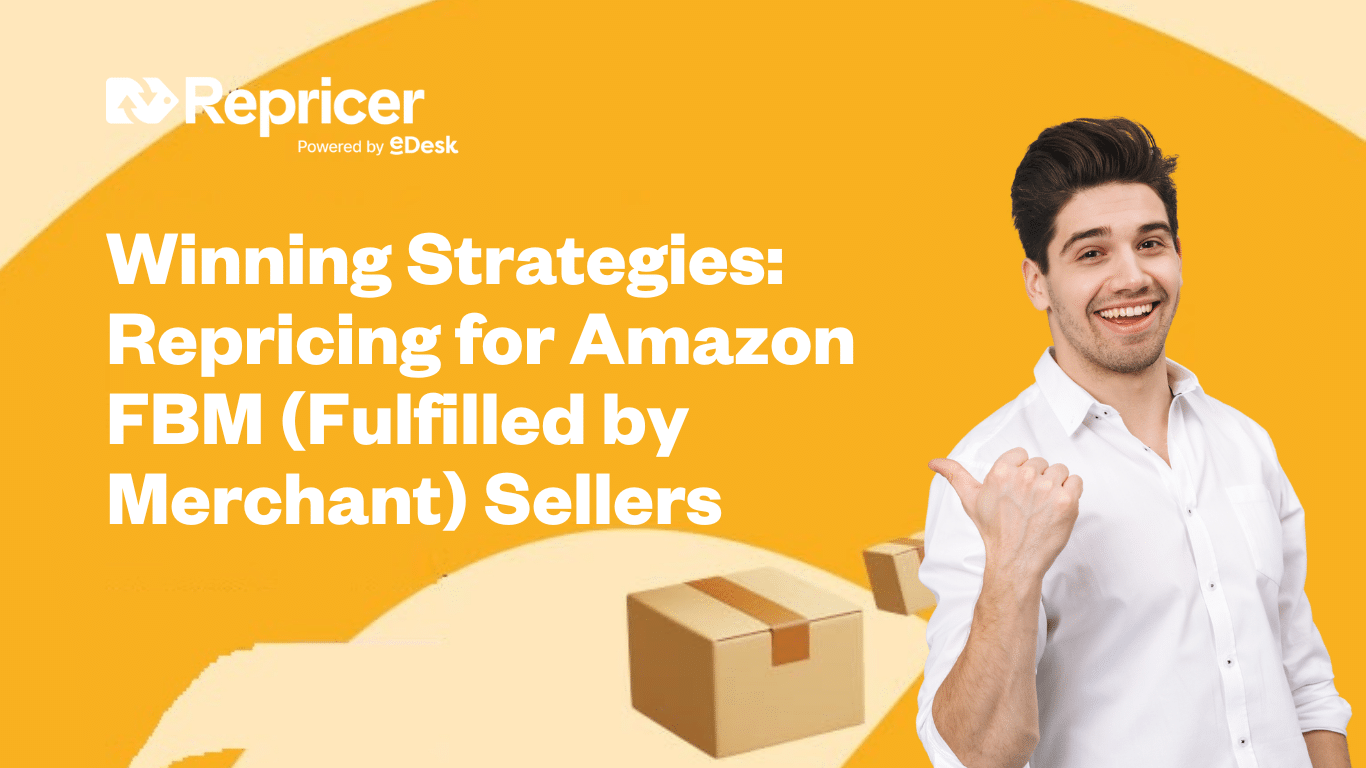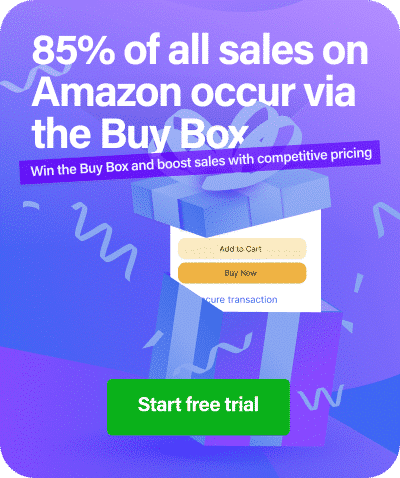Amazon’s marketplace is more competitive than ever, with over 9.7 million sellers vying for customer attention. While 82% of sellers use Fulfillment by Amazon (FBA), there’s a significant opportunity for the 34% of sellers who choose Fulfillment by Merchant (FBM). However, repricing strategies Amazon FBM requires a completely different approach than FBA repricing. Let’s dive into the unique challenges and winning strategies that can help FBM sellers compete effectively and win the Buy Box.
Understanding the FBM Landscape
As an FBM seller, you’re part of a distinct group that handles your own storage, packing, and shipping. Unlike FBA sellers who benefit from Amazon’s logistics network, you face unique challenges that directly impact your pricing strategy. The key to success lies in understanding these differences and leveraging them to your advantage.
Recent data shows that while FBA offers convenience, FBM provides greater control over costs and customer experience. With shipping costs being a challenge for 37% of Amazon sellers, having control over your fulfillment process can actually become a competitive advantage when priced correctly.
The Unique Challenges of Amazon Merchant Fulfilled Repricing
Competing Against FBA Offers
One of the biggest hurdles for FBM sellers is competing against FBA offers in the Buy Box. While Amazon no longer automatically favors FBA over FBM for Buy Box eligibility, FBA sellers still have inherent advantages:
- Prime badge eligibility (unless you qualify for Seller Fulfilled Prime)
- Faster shipping times
- Amazon’s trusted fulfillment network
- Customer service handled by Amazon
To compete effectively, your pricing strategy must account for the perceived advantages that FBA offers provide to customers.
Factoring in Shipping Costs Accurately
The most critical aspect of FBM repricing is properly calculating your “landed price” – the total cost customers pay, including shipping. Many FBM sellers make the mistake of focusing only on product price without considering how shipping affects their competitiveness.
Here’s what you need to consider:
- Weight and dimensions of your products
- Shipping zones and distances to customers
- Carrier rates and potential volume discounts
- Packaging costs and materials
- Handling time impact on shipping options
The Handling Time Factor
Your handling time significantly impacts both your Buy Box eligibility and customer satisfaction. Amazon’s algorithm considers shipping speed as a crucial factor, and customers expect fast delivery. Recent updates to Amazon’s handling time policies in 2024 have made this even more important:
- Amazon now enables automated handling time if your manually set time is two or more days slower than the actual performance
- The maximum transit time for international shipping has been reduced
- Zero-day handling time can significantly boost your Buy Box share
FBM vs FBA Competition: Leveling the Playing Field
Understanding Buy Box Dynamics
The Buy Box algorithm evaluates multiple factors beyond just price:
- Seller performance metrics (Order Defect Rate, Late Shipment Rate, Cancellation Rate)
- Shipping time and reliability
- Inventory levels and stock availability
- Competitive pricing (including shipping costs)
- Customer feedback and ratings
As an FBM seller, you can excel in areas where FBA sellers might struggle, such as specialized handling of fragile items or offering personalized customer service.
Strategic Pricing Positioning
When competing against FBA sellers, consider these approaches:
Price below FBA when: You have lower fulfillment costs, the item is lightweight, or you’re targeting price-sensitive customers.
Match FBA pricing when: You can offer comparable or better shipping times, especially if you’re enrolled in Seller Fulfilled Prime.
Price above FBA when: You provide superior value through better packaging, faster handling, or enhanced customer service.
Winning FBM Buy Box Tactics
Optimize Your Shipping Templates
Create strategic shipping templates that balance competitiveness with profitability:
- Free shipping on orders above a certain threshold (build shipping costs into product price)
- Expedited options for customers willing to pay premium rates
- Regional optimization for local deliveries, where you can beat Amazon’s speed
Master Your Performance Metrics
Excellent performance metrics can compensate for slightly higher prices:
- Maintain Order Defect Rate below 1%
- Keep Late Shipment Rate at 0%
- Ensure Valid Tracking Rate at 100%
- Respond to customer messages within 12 hours
Strategic Stock Management
Consistent inventory levels signal reliability to Amazon’s algorithm:
- Avoid stockouts by implementing proper inventory forecasting
- Use safety stock levels for high-velocity items
- Consider seasonal demand patterns in your planning
Advanced Non-FBA Pricing Strategy
Repricer Configuration for FBM Success
When setting up repricing rules specifically for FBM, consider these Repricer Features strategies:
Minimum/Maximum Price Rules: Include shipping costs in your calculations. Your minimum price should cover product cost + shipping + desired margin.
Competition-Based Rules: Set rules to compete only against other FBM sellers when FBA pricing is unrealistic for your cost structure.
Time-Based Adjustments: Implement dynamic pricing during peak shopping hours or seasonal periods when shipping demand increases.
Buy Box Targeting: Configure rules to stay within the Buy Box range while maintaining profitability, accounting for your complete landed cost.
Regional Buy Box FBM Opportunities
Amazon’s algorithm considers customer location for Buy Box decisions. This creates opportunities for FBM sellers:
- Local advantage: If you’re geographically closer to customers, you might win the Buy Box even with slightly higher prices
- Regional inventory: Stock regionally popular items that FBA sellers might not prioritize
- Shipping zone optimization: Adjust pricing based on shipping zones to maintain competitiveness
Seller Fulfilled Prime (SFP) Pricing Considerations
If you qualify for Seller Fulfilled Prime, your pricing strategy changes significantly. SFP bridges the gap between FBM and FBA by providing:
- Prime badge eligibility for increased visibility
- Enhanced Buy Box competitiveness against FBA offers
- Access to Prime customers who prioritize fast, free shipping
SFP Pricing Strategy
When enrolled in SFP, you can:
- Price more aggressively against non-Prime FBM sellers
- Compete directly with FBA pricing
- Focus on value-added services since shipping speed is equalized
However, remember that SFP comes with strict performance requirements and potential additional costs for maintaining the required service levels.
Shipping Cost Impact on Pricing Strategy
Understanding how shipping affects your competitiveness is crucial for FBM success. With the average Amazon referral fee being 15% and shipping costs varying significantly by product type, your shipping strategy directly impacts profitability.
Cost Calculation Framework
For effective FBM pricing, use this framework:
Total Cost = Product Cost + Shipping Cost + Amazon Fees + Handling Costs + Desired Margin
Then compare this against:
- Current Buy Box price
- Competitor FBM prices
- FBA equivalent prices (including their fees)
Shipping Optimization Tactics
- Negotiate carrier rates based on volume commitments
- Optimize packaging to reduce dimensional weight charges
- Consider hybrid shipping (USPS for light items, UPS for heavy)
- Implement zone skipping for distant deliveries when possible
Implementing Your FBM Repricing Strategy
Getting Started
- Audit your current pricing: Ensure you’re accurately calculating all costs
- Analyze competitor strategies: Understand how other FBM sellers in your category compete
- Set up proper tracking: Monitor your Buy Box win rate and adjust accordingly
- Choose the right tools: Implement Repricing Strategies that account for FBM-specific factors
Advanced Tactics
- Seasonal adjustments: Modify pricing during Q4 when FBM can be particularly competitive
- Category-specific strategies: Some categories favor FBM (oversized items, fragile goods)
- Bundle opportunities: Create bundles that make shipping costs more attractive
Key Takeaways for FBM Repricing Success
Successfully competing as an FBM seller requires a comprehensive understanding of your unique position in Amazon’s marketplace. Here are the essential points to remember:
Price with precision: Always include shipping costs in your competitive analysis and ensure your pricing reflects the total customer cost.
Leverage your advantages: Use your control over fulfillment to provide superior customer experiences that justify your pricing.
Monitor performance religiously: Your metrics directly impact Buy Box eligibility, so maintain excellence across all performance indicators.
Consider SFP when viable: If you can meet the requirements, Seller Fulfilled Prime can dramatically improve your competitive position.
Understanding the Amazon Buy Box Guide and comparing your approach to Amazon FBA Pros and Cons will help you make informed decisions about your fulfillment and pricing strategies.
The FBM path requires more hands-on management, but with the right repricing strategy, it can offer greater control, potentially higher margins, and the flexibility to adapt quickly to market changes. By implementing these strategies and continuously optimizing your approach, you can successfully compete in Amazon’s marketplace while maintaining the independence and control that drew you to FBM in the first place.





